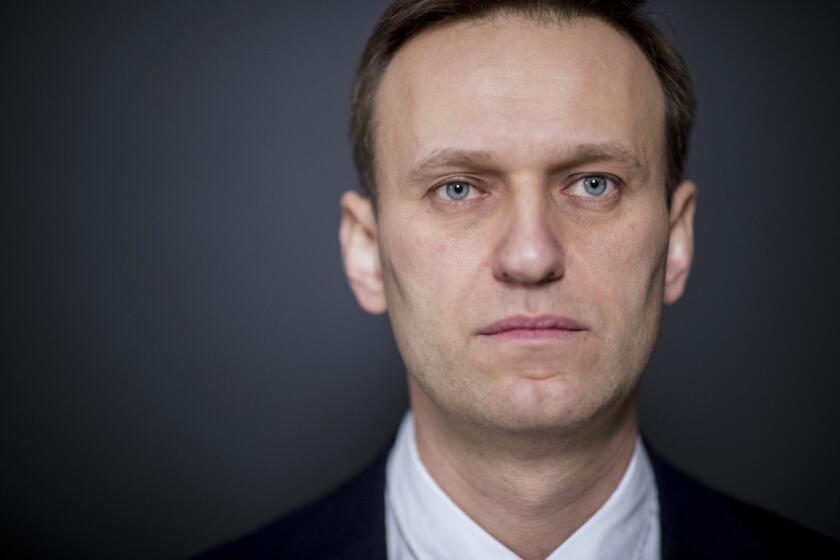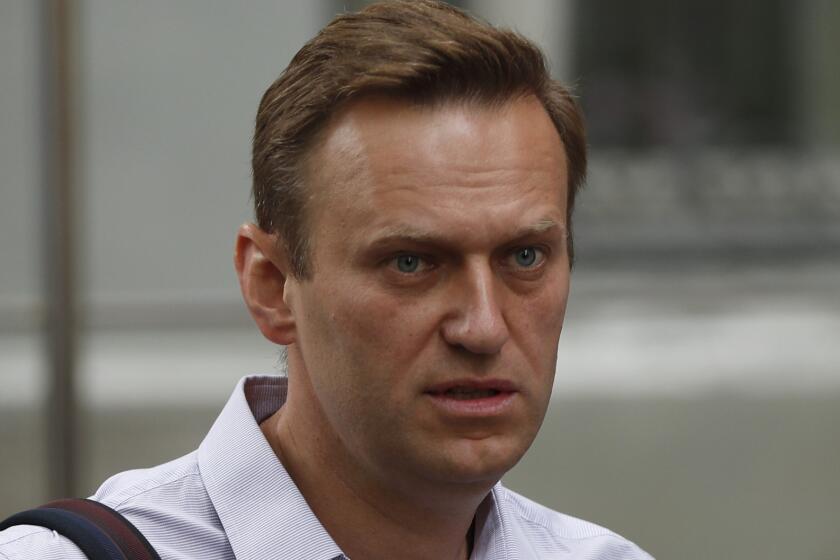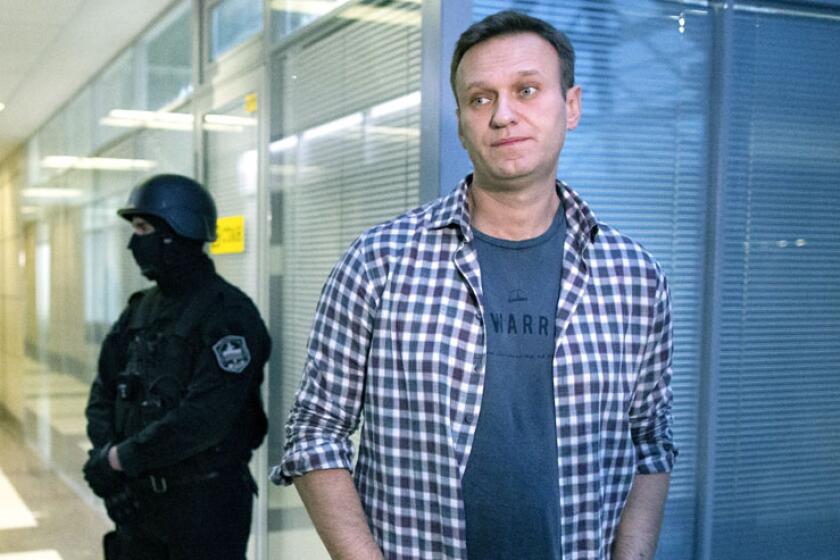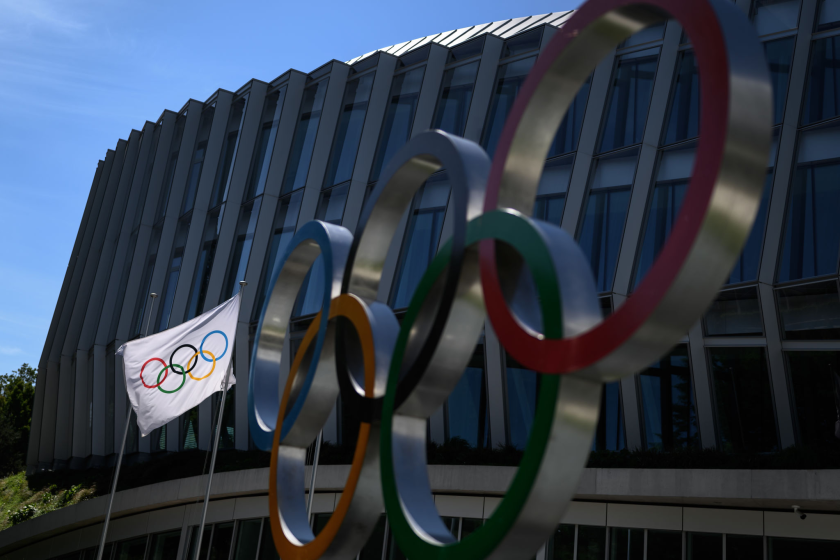Russian court orders opposition politician Navalny jailed for 30 days
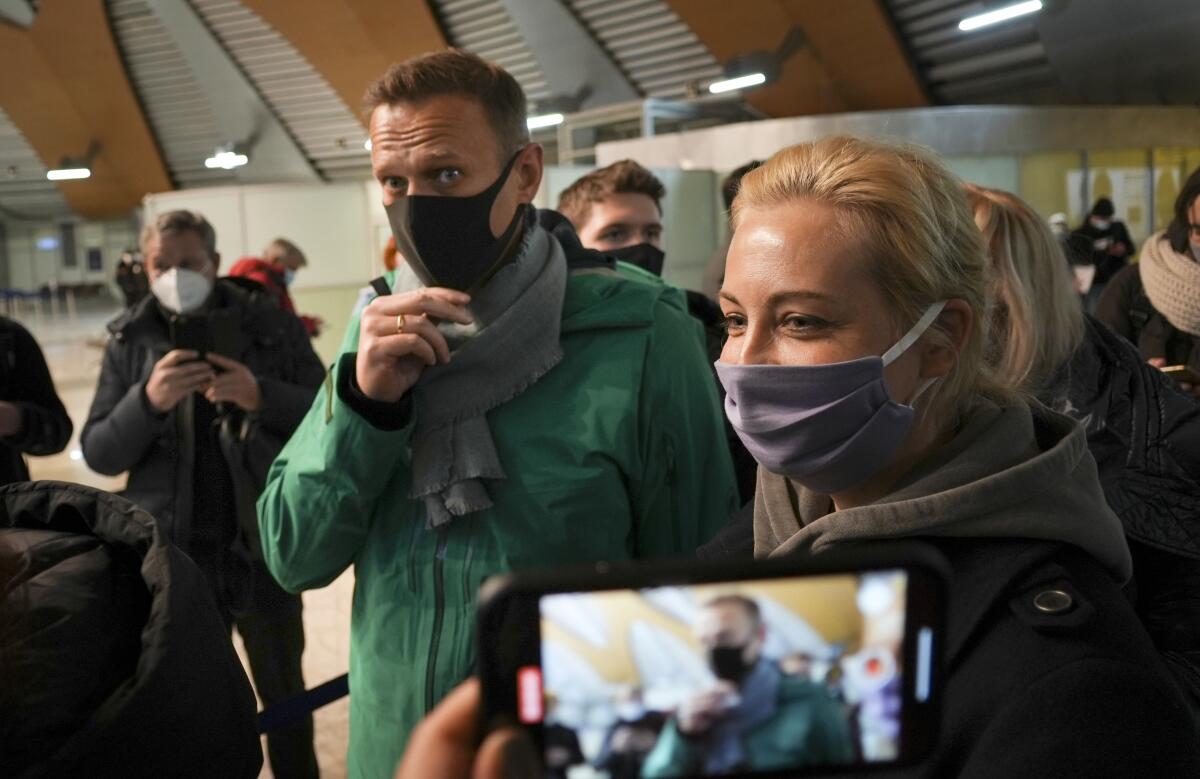
- Share via
MOSCOW — A Russian judge Monday ordered Alexei Navalny to be remanded in jail for 30 days, a spokeswoman for the longtime Russian opposition leader said.
The ruling concluded an hours-long court hearing set up at a police precinct where Navalny has been held since his arrest at a Moscow airport Sunday evening. Navalny was detained at passport control at Sheremetyevo airport after flying in from Berlin, where he had received treatment following what he and authorities in the West believe was an assassination attempt.
His arrest adds another layer of tension to relations between Moscow and Western nations, which have long been strained and were worsened by Navalny’s poisoning, which he blames on the Kremlin.
German Foreign Minister Heiko Maas noted that Navalny had returned to Russia of his own volition and said: “It is completely incomprehensible that he was detained by Russian authorities immediately after his arrival.”
“Russia is bound by its own constitution and by international commitments to the principle of the rule of law and the protection of civil rights,” Maas added. “These principles must of course also be applied to Alexei Navalny. He should be released immediately.”
Navalny’s allies said Monday he was being held at a police precinct outside Moscow and has been refused access to his lawyer. According to his lawyers, in an unexpected turn of events, a court hearing into whether Navalny should remain in custody started Monday at the precinct itself, and they were notified just minutes before.
The attack on Alexei Navalny — at least the sixth such attempt against a Russian dissident in the last five years — has provoked international condemnation on a scale not seen since the poisoning of former double agent Sergei Skripal.
“It is impossible what is happening over here,” Navalny said in a video from the improvised courtroom, which was posted on his page on the messaging app Telegram. “It is lawlessness of the highest degree.”
Calls for Navalny’s immediate release have come from European Commission President Ursula von der Leyen, the office of the U.N. High Commissioner for Human Rights, British Foreign Secretary Dominic Raab and top officials of other European Union nations.
Jake Sullivan, President-elect Joe Biden’s pick for national security advisor, called on Russian authorities to free Navalny. “Mr. Navalny should be immediately released, and the perpetrators of the outrageous attack on his life must be held accountable,” Sullivan tweeted.
Outgoing Secretary of State Michael R. Pompeo said that the U.S. “strongly condemns” the decision to arrest Navalny.
Germany says proof of Soviet-era nerve agent was found in tests on Alexei Navalny, an opponent of Russian President Vladimir Putin.
His detention was widely expected because Russia’s prisons service said he had violated probation from a suspended sentence on a 2014 money-laundering conviction.
The prisons service said it would seek to have Navalny serve his 3½-year sentence behind bars.
Russian Foreign Minister Sergey Lavrov said Monday that the condemnations of Navalny’s arrest by Western officials reflected an attempt “to divert attention from the crisis of the Western model of development.”
“Navalny’s case has received a foreign policy dimension artificially and without any foundation,” Lavrov said, asserting that his detention was a prerogative of Russian law-enforcement agencies. “It’s a matter of observing the law.”
Colleagues of Russian opposition leader Alexei Navalny say a lab detected the nerve agent on a water bottle retrieved from his hotel room in Siberia.
Navalny, 44, who is President Vladimir Putin’s most prominent and determined foe, brushed off concerns about potential arrest as he boarded his flight in Berlin on Sunday.
“It’s impossible. I’m an innocent man,” he said.
Navalny fell into a coma while aboard a domestic flight from Siberia to Moscow on Aug. 20. He was transferred from a hospital in Siberia to a Berlin hospital two days later.
Labs in Germany, France and Sweden, and tests by the Organization for the Prohibition of Chemical Weapons, established that he was exposed to a highly toxic Soviet-era Novichok nerve agent.
Breaking News
Get breaking news, investigations, analysis and more signature journalism from the Los Angeles Times in your inbox.
You may occasionally receive promotional content from the Los Angeles Times.
Russian authorities insisted that the doctors who treated Navalny in Siberia before he was airlifted to Germany found no traces of poison. Russia refused to open a full-fledged criminal inquiry, citing a lack of evidence that Navalny was poisoned, and officials have challenged Germany to provide proof of the poisoning.
Navalny has been a thorn in the Kremlin’s side for a decade. Russian authorities have launched multiple criminal investigations against him, and he has been tried and convicted in two separate criminal cases widely seen as politically motivated.
In December 2014, Navalny was convicted on charges of fraud and money-laundering and received a 3½-year suspended sentence, which he denounced as politically motivated and the European Court of Human Rights found “arbitrary and manifestly unreasonable” three years later.
The sentence carried a probation period that was due to expire in December 2020. Authorities said the politician was subject to regular in-person checks with law enforcement officers as one of the conditions of his probation.
Russia can’t use its name, flag or anthem at the next two Olympics. The decision in the doping case has drawn mixed reactions around the world.
Russia’s prison service first accused Navalny of not appearing for these checks Dec. 28 — two days before the probation period was supposed to end.
Navalny and his team rejected the accusations and said the move was an attempt by the Kremlin to keep the politician from coming back to Russia.
Three days before his return to Moscow, the prison service alleged in a statement that Navalny repeatedly failed to appear for the checks, including when he was convalescing in Germany, and said it was “obligated to undertake actions to detain” him.
Navalny had repeatedly said he would come back to Russia despite threats of arrest, saying he didn’t leave the country by choice but, rather, “ended up in Germany in an intensive care box” and said he was still dedicated to his cause.
“I will go back to Russia, I will continue my work. No other possibility has ever been considered or is being considered,” Navalny said in October.
More to Read
Sign up for Essential California
The most important California stories and recommendations in your inbox every morning.
You may occasionally receive promotional content from the Los Angeles Times.
